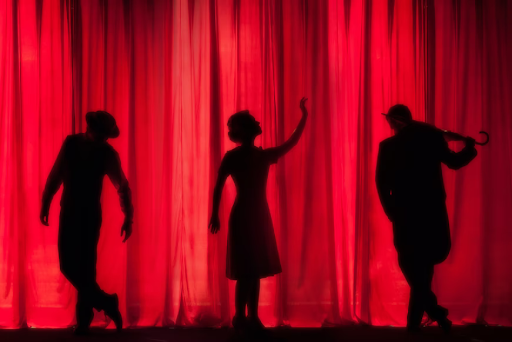Improv coaches host workshops to help their students boost their creativity, communication skills, comedic timing and social freedom. Life coaches help their students set and achieve a far broader range of personal and professional goals.
You may think there isn’t much of a link between the two…
However, I would still suggest that all coaches could up their game by taking improv classes and learning from the teachers there.
Let’s dive right into it.

17 Coaching Tips You Can Learn From Improv Coaches
Here are 17 lessons you can expect to learn to not only become a better improv actor, but a better coach too.
1. Be Present
A common mistake made in improvisation classes is for actors to get stuck in their heads. In other words, they’re too busy thinking about what to say next to be fully present in the moment.
They might not even properly listen to what their fellow students are saying.
A good improv coach will teach you to stay present, not think ahead and trust in your abilities to respond when the time comes.
This is a great lesson for all coaches to learn. The ability to be present and actively listen to your client is crucial, not only so you really understand what they’re trying to tell you, but also so they can see you’re engaged in the conversation.
2. Never Expect An Answer
An improvised comedy sketch can easily be derailed by one of the performers freezing or blurting out something unhelpful.
This can happen when a performer was waiting for a certain line that never materialised. It’s tempting to plan ahead in any conversation, whether it’s an improvised comedy sketch or a coaching session.
But this leaves you vulnerable to feel ‘stuck’ when the conversation takes an unexpected turn.
You can avoid this problem on stage – and with coaching clients – by remaining present to the moment at all times.
3. Don’t Interrupt
Whether you’re in an improv sketch, coaching session or casual conversation with friends, it can sometimes be tempting to jump in with the perfect line at the perfect moment, even if it means interrupting someone.
In improv and especially in coaching, this tends to be a terrible idea.
Even if your thoughts are on point, interrupting someone usually makes them feel like you didn’t care about what they were saying. Practice patience instead.
4. Work Towards The Same Goal
A great way to ruin an improv performance is to make it all about you.
Rather than working with their team towards the common goal of creating entertaining scenes, some performers might care more about stealing the show with their amazing acting skills.
This can lead to some trainwreck scenes, especially when everyone on the team tries to be the star.
Inexperienced coaches can make the same mistake of making it all about them, talking too much and not letting their client get a word in. Great coaches work with their client towards the common goal of helping them identify and reach their goals.
5. Dare To Be Dull
You don’t have to be exciting or outrageous to reach your team goal in improv comedy. In many cases, you’ll do a better job letting someone else take center stage and playing off them.
The same is true in one-on-one coaching. In fact, it’s essential to a productive coaching session for the client to be doing most of the talking.
Related content: Online Life Coach: The Complete Guide
6. Make Everyone Else Look Good
This is one of the most underrated skills to develop if you want to be an incredible performer or coach.
In either role, if you can help other people look and feel great, you’re doing an awesome job.
7. Always Accept What The Other Person Says
It’s a golden rule of improv not to dismiss what anyone says as ‘wrong’. It’s far more productive to accept what they say and work with it.
You should take that golden rule into your coaching sessions. It’s not your job as a coach to decide what is right or wrong for someone else. Instead, take what your client says with no judgement and help them explore what they think is best for them.
8. How You Make People Feel Is More Important Than What You Say
People don’t tend to remember the words you say as much as how it made them feel.
As such, there’s no reason for improvisers to sweat too much on having the ‘perfect comeback’ during their performances. It’s the vibe that’s most important to the success of a scene.
A life coach would do well to take note of this lesson when learning how to make a lasting impact on their students.
9. Be Brave, Not Impressive

This advice will help you grow as a performer, a teacher and as a person.
Let’s say you have a natural talent for performing comedy sketch shows. Does that mean you should be performing these every week at improv school? Or should you be brave enough to practice more challenging scenes?
The former option might impress the audience at your classes more, but the latter will lead to added growth as a performer. Perhaps you won’t bring the house down this week, but with this attitude, you’ll eventually become one of the best in the game.
As a teacher, you may occasionally face similar dilemmas. You may be torn between talking about something that impresses your student, or being brave enough to discuss what will actually help them. Indeed, it’s the uncomfortable conversations that tend to be the most beneficial.
10. Have Fun!
Remember: how you make people feel is far more important than what you say.
On top of that, emotions tend to be infectious.
If you’re enjoying your improv scene, others are more likely to enjoy watching it. If it looks like you’re struggling on stage, the rest of the school will struggle to watch you.
This example of musical improv shows how much fun it can be to act with a team on stage.
Anyway, it’s the same deal with coaching. If you can learn to enjoy working with your clients, they’ll be more likely to look forward to your coaching sessions all week.
Advanced Improv Exercises
These improv exercises will take your coaching to the next level.
11. Use “Could” Instead Of “Should”
Your choice of words has a huge impact on the people you’re communicating with.
For example, if you use “could” instead of “should” when giving feedback, it comes across as a suggestion, rather than a command.
This small tweak makes it easier for people to take your feedback on board without any hard feelings, both in improv and coaching.
12. Use “Yes, And…”
“Yes, and” is one of the most well-known improv exercises. It helps performers learn to accept what their team-mates say, then build on it.
In this exercise, actors respond to what their team-mate says, with ‘Yes…and” then add something to move the scene forwards.
Students will quickly learn that “Yes, and” will create more progress than ‘Yes, but’ or ‘No, actually’.
There’s no reason why you can’t take this lesson into your coaching sessions too. Great coaches will always take what their client says on merit, after all.
13. Use Time Travel
In improvisation classes, you’ll quickly learn that conversations stuck in the present tense are moments away from dying. However, if you can shift them to focus on the past or future, they can continue endlessly.
Whenever improvisers want more information about the topics their co-stars introduce, they can inquire about the past or the future.
That’s also true with in-person conversations; a useful tip for coaches searching for more information from clients.
14. Help People Understand Why They’re Doing What They’re Doing
A great improv coach will encourage their students to always question why their characters are behaving in a certain way. This helps them make a logical move for their character, leading to more believable and entertaining performances.
Interestingly enough, a great coach will also constantly be encouraging their students to question why they’re making certain decisions. This can lead them to make more of the moves that are ‘right’ for them in their lives.
As a coach-in-training, it may also help for you to question why you’re taking specific actions in your sessions. Indeed, by the time you become a certified coach, this is something you’ll be expected to understand at all times.
15. Repeat What The Other Person Said To Make Sure You Understand
This is recommended both in improv performances and within coaching sessions.
In both cases, it helps clarify what the other person said, ensure you understand them and it gives you time to plan a response.
16. Once You’ve Made A Decision, Own It
This is great advice for any improv actors and coaches.
In an improvised play, when a character’s actions or words are performed with indecision, it serves to create a less believable scene for the people watching. However, if the character owns their decisions, the audience tends to buy in no matter how illogical the scene is.
It’s important to be confident in your decisions as a teacher too. This is how you get a student to buy in to what you’re saying and ultimately change their behavior.
17. Don’t Be Afraid To Admit If You Messed Up

This tip is somewhat at odds with the last one. It’s included because there are some occasions where we mess up and the rest of the world knows it.
On these occasions, our pride may persuade us to try and keep plowing forward anyway.
The thing is: by ignoring the elephant in the room, your students and colleagues may begin to lose faith in you.
In this case, it’s nearly always better to admit your mistakes and start from a clean slate.
Ironically, one of the only exceptions to this advice is if you’re acting in a live improv sketch or a play. In this case, it can be better to improvise your way out of the hole you created for yourself, rather than break character to admit you fluffed a line.
Improv Techniques For Business Coaching
Wondering whether these improv techniques can help improve your business coaching? The beauty of these tips is they apply across all fields of coaching.
So whatever field of coaching you choose to specialise in, this advice can help you!
Any Questions?
Thanks for reading my guide! I hope it proved to be of benefit to you.
For more insights on the similarities between different coaches and coaching techniques, see this guide on the Unique Types Of Life Coaches.
If you’d like to ask a question about improv workshops and other types of coaching, you can do so by writing it in the comments section below.
If you’ve performed scenes at improv comedy workshops and would like to share how it helped you elsewhere in life, feel free to leave a note about that too!
It would be awesome to hear from you guys!
Related Posts
12 Insights in Neurocoaching – Complete Guide
